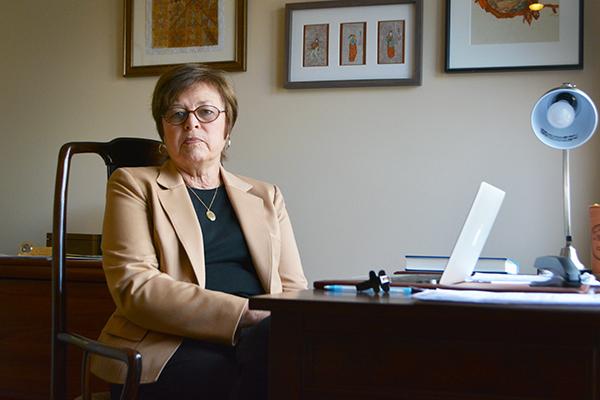Updated: Feb. 8, 2016 at 8:21 p.m.
GW’s nursing school plans to offer a massive open online course to the public in May – with a twist.
While the school is well-known for its extensive online offerings, this will be the school’s first MOOC, a non-degree course that will be open to the public for a small fee. Experts said that charging for a MOOC can give the course credibility and keep students engaged.
This course will differ from the five other MOOCs currently offered by GW. While courses like “The Past, Present and Future of the Federal Reserve” are available directly through the University’s website, the nursing school’s course will be hosted by an online platform called Coursera.
Students browsing GW’s online offerings or the Coursera website will be able to access the course, which will be called “Improving Healthcare Quality.” Faculty in the nursing school have been working with engineers in GW’s eDesign shop and representatives from the National Committee for Quality Assurance to create the nearly 30 videos that make up the content of the MOOC.
The partnership with Coursera is a nod to the former role of Pamela Jeffries, the dean of the nursing school. Jeffries served as the first vice provost of digital initiatives at Johns Hopkins University and has worked with Coursera in the past.
Jeffries said that MOOCs are just one component of the technological revolution that is affecting higher education. She said in an email that working with Coursera will allow their courses to reach an audience of more than 15 million people worldwide.
“The platform offers SON and GW, on the whole, the unique opportunity to expand brand recognition and deliver on our mission of service by offering high-quality, free short courses while showcasing our traditional programmatic offerings,” Jeffries said.
Daphne Koller, the president and co-founder of Coursera, declined to comment on Coursera’s work with GW.
MOOCs do not provide students with any certification or degree. However, Coursera offers students the chance to earn what they call a statement of accomplishment if they wish to pay a fee of $25 to $50 per course. Experts said this certificate is similar to what one would receive after taking a coding course online ‒ resume padding that indicates a learned skillset.
In a partnership with Coursera, universities collect 50 percent of the revenue.
Jean Johnson, the former dean and current professor at the School of Nursing, said she is closely involved in the production of the MOOC, which she hopes will be followed by four or five more in the next two years.
Johnson said that the course will cover topics like statistics of medical error, the science of safety and how to build a culture of quality in a clinical practice. The course will also have an international component, examining how issues of health care quality emerge and are solved in other countries.
Paul Schiff Berman, the former vice provost for online learning and academic innovation, recently gave a presentation to the Faculty Senate that highlighted accomplishments in online learning at the University, including the success of MOOCs.
Berman said in an interview that online learning at GW used to focus primarily on graduate programs. But with faculty specifically interested in building large-scale online courses, Berman’s team of administrators, along with the eDesign shop, began to expand the reach of online learning.
“We pursued a targeted group of MOOCs in areas where we believed that GW could create an offering that was unique or distinctive,” Berman said. “We saw these as opportunities to promote the University and as opportunities to provide education to the world.”
John Sloop, professor of communication studies and associate provost of digital learning at Vanderbilt University, has worked with Coursera to create MOOCs for all of Vanderbilt’s 12 colleges. He said the company’s wide reach is a draw for universities.
“It’s the difference between having to do everything yourself and having someone else do a lot of the work,” Sloop said. “But you have to remember that Coursera is a for-profit company. They don’t have to make sure anyone else makes a lot of money.”
Avery Anapol contributed reporting.
This post was updated to reflect the following correction:
The Hatchet incorrectly reported that students who pay a fee can receive a course certificate if they complete the MOOC. What the students will actually receive is referred to as a statement of accomplishment. We regret this error.






